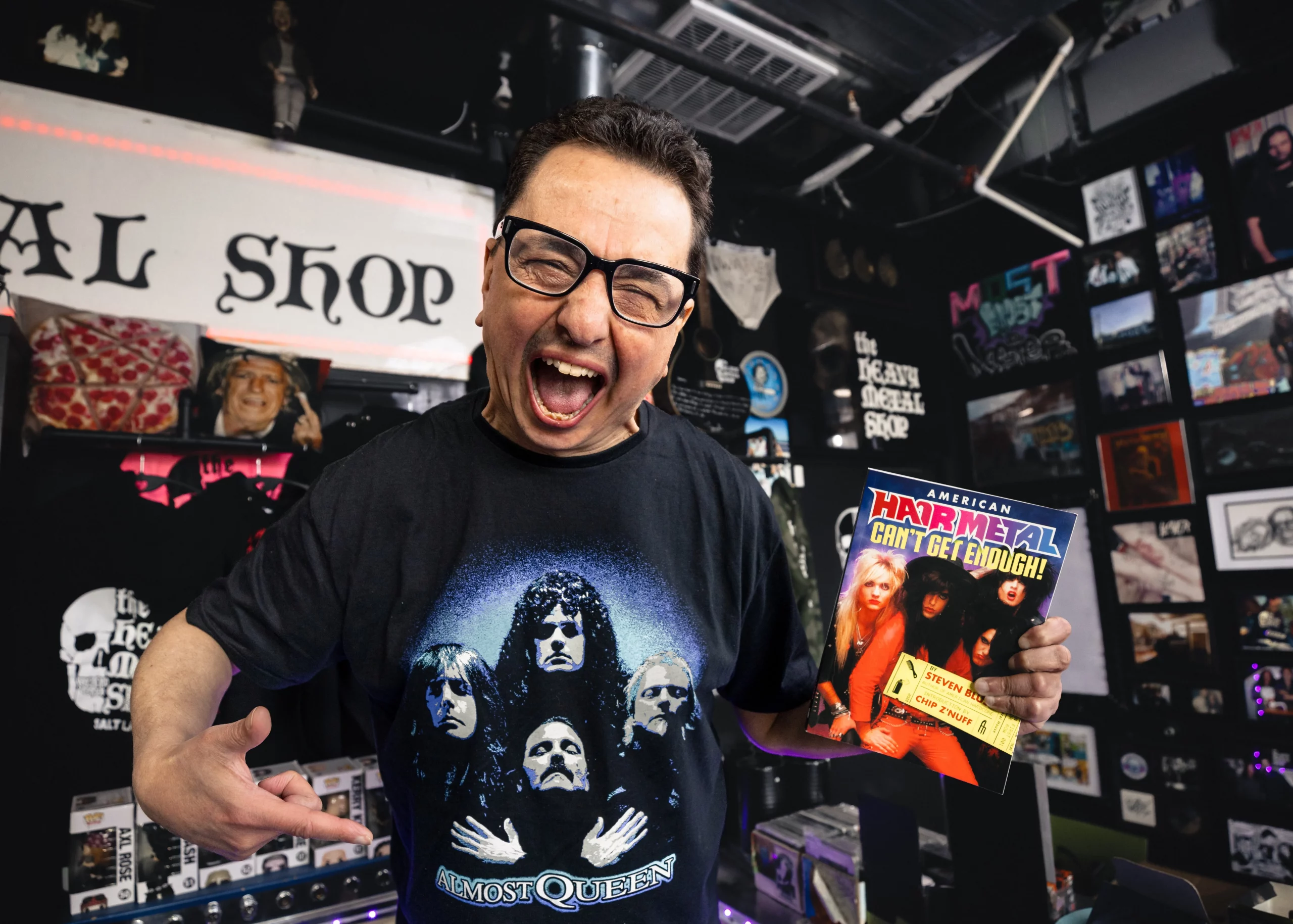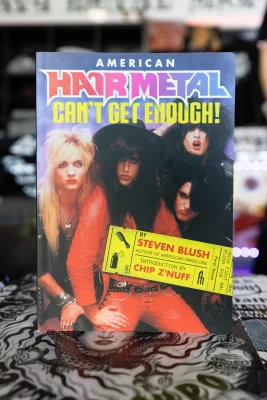
American Hair Metal—Ain’t Nothin’ but a Good Time!
Book
Ah, hair metal. It may have been a segment of entertainment that was a flash in the pan, but it’s a flash that everyone remembers. And I do mean “flash!” You may remember the lace and leather, spandex pants, teased hair and showgirl makeup, as well as the gallons of booze, kilos of blow and all the debauchery that ensued, more than the music itself. It’s all captured in this professionally published scrapbook, American Hair Metal: Can’t Get Enough (2024) (the secondary title is referring to the song of the same name by Winger).

“How did I get from hardcore to hair metal?” author Steven Blush asks himself. “I don’t know. It just happens.” Blush was submerged in the early DC hardcore scene, which prompted him to pursue journalism and led to him writing his seminal book American Hardcore: A Tribal History (2001) and six other publications to his name. As he grew older, he refused to keep himself affixed to one type of music and its respective lifestyle, making it his goal to learn as much about music as possible. “To be a writer, you have to have a really wide breadth to be able to talk about anything,” he says. “All my books are a little bit different. I love music. Don’t let the labels get to you.”
“I love music. Don’t let the labels get to you.”
Knowing his background, it’s interesting to see him pursuing hair metal—in many ways, it was the antithesis of hardcore. Hardcore was serious and deep, while hair metal was about getting loaded and getting laid. Hair metal bands had teams of publicists and lawyers to shape their public image in a way that fit their fans’ perceptions. Hardcore didn’t have such people to hold a veil over their faces. Also, hair bands weren’t exactly the most modest—”They couldn’t shut their mouths,” says Blush. This all funneled down to how the book was conceived, as the interviewees were more guarded about their past, not wanting to unveil too much out of either shame or embarrassment. What this resulted in was a compilation of quotes and an allotment of photos from various publications. “Every one of them means something,” says Blush. “It’s funny, but it also tells you how they were living.”
How they lived was the ultimate rock ‘n’ roll experience—a party lifestyle with overindulgence in booze, drugs and girls—and all the chaos that resulted. There was a sort of mythos behind these stars, who looked so big and untouchable that it felt like they were gods amongst men. “[Hair metal] had almost no significance other than being party music,” says Blush, “…to just have a good time and not be taken seriously.” Arguably, it was hair metal’s simplicity that gave it such mass appeal but, in turn, shortened its lifespan. There was no dedication, no integrity and no endgame—basically just a philosophy of “party ‘til you drop,” and that’s exactly what most of them did. “The genre was on for about ten years, but as soon as grunge hit the scene, they all ran away,” says Blush.
There are a few bands still carrying the torch, sporting few surviving members, which slots their significance in congruence with tribute bands. Others that still have some draw left are performing and acting like they always had, in a vain attempt to retain that flame that burnt out 30 years ago. “[These bands] are not dangerous anymore,” says Blush. “You need to be age-appropriate for what you’re doing in your life.” Some bands were able to mature to the point where they don’t need the “flash” anymore and genuinely believe that their music alone can still reach people. “This music that so many of us embraced is getting its due,” says Blush, “because it was just intense.” But don’t hold your breath for hair metal having a comeback. “It was just about going out and partying and getting laid and having a good time,” adds Blush, “and I think we’ve gotten away from that.”
“It was just about going out and partying and getting laid and having a good time.”
Music is reflective of the nature of society—people today are more conscientious about international events and current affairs, so it imposes a need to stand up and say something. “People have gotten too serious about music,” says Blush. “The world isn’t trending [toward] ‘party music.’” He goes on to say that there is a need for a major deconstruction of music to influence such immense socio-political interest. “Music is kind of cyclical, but I don’t see the next Guns N’ Roses,” he adds. “There are people who can [imitate], but is there going to be a movement? I don’t know.”
Hair metal had its time and place, and in many ways those bands were the last of the rockstars. The big names in rock music today don’t have the bravado and “fuck everything” attitude to the same immense degree Nikki Sixx or Axl Rose once did. “I’ve written a history book,” says Blush. “There are certain currents in culture that come to pass.” In American Hair Metal: Can’t Get Enough, Blush captures a time when rock music encouraged you to be loose and irresponsible… and sometimes, that’s not a bad thing.
To see more by Steven Blush, visit his website stevenblush.com and keep up to date with his activities by following his Instagram account @thestevenblush—all of his books are available for purchase through Amazon.
Read more interviews with authors:
“Something Super Bizarre and Fucked Up”: Literature As Play with Author Michael Farfel
Through Suffering, Hope: The Healing Power of Betsy L. Ross’ The Bones of the World